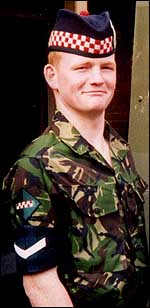![]() Lance-Corporal
Andrew Craw
Lance-Corporal
Andrew Craw
The London Times - January 9, 2004
Scots soldier had only been in Iraq two days - By a Scotland Correspondent
 A
SOLDIER killed in a “tragic incident” on a training range in Iraq
had only arrived in the country two days previously.
A
SOLDIER killed in a “tragic incident” on a training range in Iraq
had only arrived in the country two days previously.
Lance-Corporal Andrew Craw, of the 1st Battalion Argyll & Sutherland Highlanders,
died in a training accident near Basra on Wednesday. He had arrived in Iraq
on Monday to begin a six-month tour of duty after a recent promotion.
The Ministry of Defence said that it had launched an investigation into the
death of L/Cpl Craw, 21, who was single. His commanding officer, Lieutenant
Colonel Jonathan Gray, paid tribute to the “bright and promising soldier”,
who was the seventh Scots soldier to die since the conflict began.
In a statement last night, the soldier’s parents, James and Ray Craw, from
Tullibody, in Clackmannanshire, spoke of their shock and sadness. “He was
a wonderful son and brother — and those that knew him will remember his
maturity and lively sense of humour,” they said. “Words cannot express
the depth of our grief, but mixed with our profound sadness there is pride in
the knowledge that he died a soldier while serving his country.”
See
Lance-Corporal Andrew Craw's gravestone at Tullibody - July 6, 2005
The Scotsman - January 9, 2007
Tragic soldier 'lacked training' - AISLINN SIMPSON
A SERGEANT in charge of a firing
range in Iraq on which a young Scottish soldier accidentally shot himself said
yesterday he was "furious" that he was not given longer to train his
men.
Lance-Corporal Andrew Craw, 21, of 1st Battalion Argyll and Sutherland Highlanders,
died after he tried to unjam a new Belgian Minimi light machine-gun after just
three hours' sleep.
His battalion had been taken to the firing range in Basra, to learn how to use
the guns, but atrocious weather forced trainers to cancel the session.
An Army Board of inquiry in September found that the lance-corporal died when
the gun went off as he tried to kick it into the cocked position with his hand
over the barrel.
Yesterday, Sergeant Calum Wilkinson, the range conducting officer, said that
he only knew they were using the new guns when he saw soldiers loading them
into a lorry heading for the firing range.
He told Andrew Walker, the Oxfordshire assistant coroner, that he felt the soldiers
were being trained "at the last minute".
The hearing continues.
The Scotsman - January 12, 2007
Major quizzed over firing range death - ANDY CRICK
A SENIOR army officer responsible for the firing range where
a young Scottish soldier shot himself was yesterday questioned by a coroner
over the death.
Major Alistair Aitken was asked repeatedly why Lance-Corporal Andrew Craw had
been allowed on to the firing range to use a machine gun after only two hours
sleep and no proper training with the weapon.
The 21-year-old, from the 1st Battalion, Argyll and Sutherland Highlanders,
kicked the butt of his Belgian-made Minimi machine gun while trying to clear
a blockage, and fired a round through his hand and into his skull.
He died a few hours later as he was being transported to a military hospital.
On the third day of the inquest into the young Scot's death, the assistant deputy
coroner for Oxfordshire, Andrew Walker, questioned Major Aitken, the chief of
staff at brigade headquarters in southern Iraq, why L-Cpl Craw and the 43 other
soldiers in his battalion were not given time to sleep after flying into the
Gulf.
"Why was there the urgency that they had to do the training that day, when
the range was going to be there the next and the next day?" Mr Walker asked.
Major Aitken replied, "The urgency was to get them out, doing the job."
He added that he needed his troops to be able to move on to "top-level"
training, firing weapons from the roofs of Land Rovers.
Mr Walker continued: "What was it necessary for them to go on the range
that day? They could have had eight hours rest and come back in the afternoon."
Maj Aitken said that he could not answer that question.
However, he added that the battalion was trained to go "straight into theatre"
and that having little rest was not unusual.
L-Cpl Craw of Tullibody, Clackmannanshire, died on 7 January, 2004, en route
to the Shaibah military hospital in Basra, southern Iraq.
The inquest was adjourned until today.
The Scotsman - January 13, 2007
Army at fault over firing range death - ANDY CRICK
A CORONER has criticised the army for its 'cavalier' approach and 'serious
failures' which led to the death of a young Scottish soldier on a firing range
in Iraq.
Andrew Walker, deputy coroner for Oxfordshire, said Lance-Corporal Andrew Craw,
21, and his colleagues deserved better from the army.
L-Cpl Craw, from Tullibody, Clackmannanshire, died after accidentally shooting
himself in the head with a machine-gun during weapons training. A four-day inquest
into his death heard that the 21-year-old had slept for only two-hours before
being sent on to the range to use a machine-gun with which he was unfamiliar.
Experts also told the hearing there was a delay in getting medical help for
the injured soldier, which may have contributed to his death.
Mr. Walker added that he would write to the Defence Secretary Des Brown, and
the Army Medical Directorate to seek improvement in medical packs to increase
soldiers' chances of surviving injuries.
L-Cpl Craw's father, James Craw, 43, and Mother Ray, 46, said the verdict on
their son's death had been the right one.
Mr. Craw said: "We were down here trying to clear our son's name and we
have succeeded. Our son was not to blame."
Mrs. Craw said her son was a proud soldier from a long tradition of serving
the army. "One of his uncles and one of his grandfathers was in the paratroopers,"
she said. "He wanted to go on to the SAS. The army was his life."
 L-Cpl Craw,
of the 1st Battalion Argyll and Sutherland Highlanders, died on 7 January, 2004
en route to Shaibah military hospital in Basra, southern Iraq. He had been practicing
with a Belgian-made Minimi machine-gun on the Braemar range when he tried to
clear a blockage in the firearm. He placed the butt of the gun on the ground
while he held his hand over the barrel and kicked it. The weapon fired a round
which went through his hand and into his head, causing massive brain injury.
L-Cpl Craw,
of the 1st Battalion Argyll and Sutherland Highlanders, died on 7 January, 2004
en route to Shaibah military hospital in Basra, southern Iraq. He had been practicing
with a Belgian-made Minimi machine-gun on the Braemar range when he tried to
clear a blockage in the firearm. He placed the butt of the gun on the ground
while he held his hand over the barrel and kicked it. The weapon fired a round
which went through his hand and into his head, causing massive brain injury.
During the inquest at Oxford County Hall, the coroner heard how the 44-man battalion
was sent straight on to the range just hours after landing in Iraq following
a long flight from RAF Brize Norton.
Evidence was also heard that the range also had no direct communication link
to the nearest military hospital, 20 miles away, and had insufficient medical
facilities.
Witnesses told how a wounded L-Cpl Craw had to wait an hour-and-a-half for a
helicopter to take him to hospital.
"Summing up, Mr Walker said: "L-Cpl Craw was a skilled and professional
soldier who deserved to have in place the basic communication and medical facilities
as set out within the range standing orders. There were serious failures in
the planning of the Braemar range and on the day that L-Cpl Craw was injured
a cavalier approach to the standing orders put in place to provide for the safety
of those using the range."
Mr Walker recorded a narrative verdict.
Iraq - Body Count | Iraq - British Casualties | Afgan - British Casualties | Afgan - Coalition Casualties | MOD -Andrew Craw